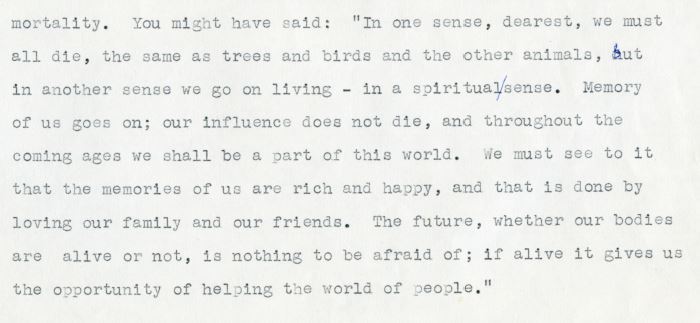Memory
In his letter, Harlow Shapley, an American scientist, writes: “In one sense, dearest, we must all die, the same as trees and birds and the other animals, but in another sense we go on living – in a spiritual sense. Memory of us goes on; our influence does not die, and throughout the coming ages we shall be a part of this world. We must see to it that the memories of us are rich and happy, and that is done by loving our family and our friends. The future, whether our bodies are alive or not, is nothing to be afraid of; if alive it gives us the opportunity of helping the world of people.” A sentiment addressed consistently throughout the letters in the Kaderli collection, Shapley suggests a kind of immortality through memory and living on in spirit. Whereas other authors, such as Tsanoff and Merton, mention an inherent immortal quality present in values like love and kindness, Shapley refers to these values as a vector for creating the kind of legacy on earth that will preserve our spiritual existence even after we are gone.
A similar understanding of the power of memory and impression is also conveyed by Nelson Glueck, who remarked that: “There is a definite immortality in the fact that you in your person preserve the identity of your parents even as your daughter some day when she has children will preserve the identity of her parents, and so on.” The meaning produced by these statements amounts to the old wisdom that the older generations live on in the younger generations, and in this way can live longer and be made immortal. Instead of dying with the flesh, our being continues as a spirit passed from person to person by means of stories, pictures, and videos. The memory of our existence continues long after our death because of the continued existence of someone who remembers us and continues to carry the torch of our existence forward to the next bearer. This answer, which folds the individual, at death, into a kind of collective memory, attempts to provide a poetic and timeless understanding of humanity’s struggle with death.

